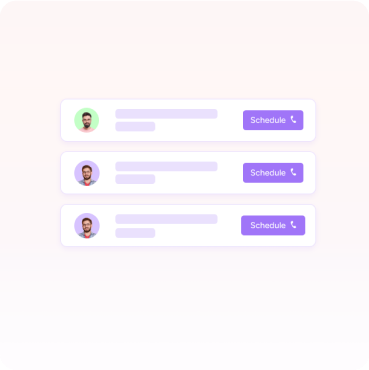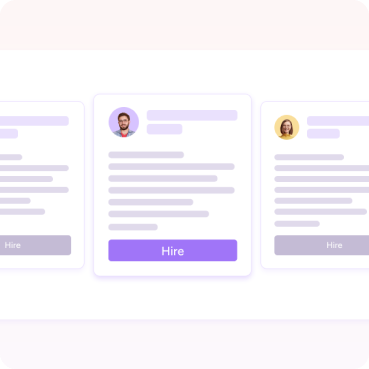Regular hiring
High RiskHire Python Developers of Silicon Valley caliber
Hire pre-vetted full time remote Python Developers from India. Hire now and build your dream engineering team with Hyno
Join 4,000+ companies already growing








Our Top Remote Developers
Hyno conducts rigorous testing and carefully vets the developers who are fueled by passion and skill sets. Hence, our developer community is the foundation for innovation and collaboration, bringing ideas and projects to fruition.
OUR STANDARDS
Hyno vs. Your regular recruitment process.
Find a risk-free, pre-interviewed, high-quality developer who is remote-ready in less than 2 weeks at 40% less cost.
Parameters
Choose the right for your firm.Time
Fees
Quality
Pre Screening
Remote readiness check
Termination
Failure rate
1 - 4 Months
> $1000
High
Low
Freelancing
High Risk1 - 2 Months
No fee
No
Very high
 Low Risk
Low Risk
0 - 15 Days
No fee
No
Very low
Pricing Starts from $35/hr
Accomplishing everything in just 3 steps
Our technical manager aligns the required skillset and tech stack with our talent pool to help you find the best fit.

Shortlisting candidates
Precise Hiring: Understanding, Gathering, and Shortlisting nittygritty.
-
 We start by thoroughly understanding your unique needs and specifications.
We start by thoroughly understanding your unique needs and specifications.
-
 check markWe
align the developer details with company goals. This way, we tailor the candidate
selection to seamlessly integrate with the organization’s vision and goals.
check markWe
align the developer details with company goals. This way, we tailor the candidate
selection to seamlessly integrate with the organization’s vision and goals.


Scheduling an Interview
Effortless talent selection: Finding your perfect match
-
 We connect you with the chosen candidates to ensure a personalized experience.
We connect you with the chosen candidates to ensure a personalized experience.
-
 Our rigorous
selection process guarantees that you find candidates who align seamlessly with your
requirements.
Our rigorous
selection process guarantees that you find candidates who align seamlessly with your
requirements.


Onboarding the talent
Streamlined onboarding for peak performance.
-
 The selected/qualified talent integrates smoothly through structured onboarding to
quickly adapt to projects, processes, and team dynamics.
The selected/qualified talent integrates smoothly through structured onboarding to
quickly adapt to projects, processes, and team dynamics.
-
 We go beyond
integration to offer ongoing support for a seamless transition to ensure that the
new talent exceeds your expectations.
We go beyond
integration to offer ongoing support for a seamless transition to ensure that the
new talent exceeds your expectations.


Read hiring guide
A one-stop shop to hiring the right Python Developer
How to hire a Python Developer? Skills to look for, interview questions, and more
Hiring a dedicated developer for your business can
be a cumbersome task. As many companies are competing to hire top Python
developers,
so finding a good developer is not as easy as it may seem.
We're here to assist all employers who choose to hire Python Developer on
their
own. Recruiting a developer on your own requires a fair amount of software
development experience in general. However, if you're a non-technical manager
interested in learning more about how to hire a Python Developer, we've put
up
an excellent resource for you.
Things to check Key Skills Required for a Python Developer?
The following are the key skills that a developer should possess to become proficient in Python:
1. Proficiency in Python: A strong understanding of the Python programming language and its core concepts, such as data types, control flow, functions, and classes.
2. Knowledge of web frameworks: Candidates should have experience with web frameworks such as Django, Flask, or Pyramid.
3. Understanding of object-oriented programming: Candidates should have a solid understanding of object-oriented programming principles, as Python is an object-oriented language.
4. Familiarity with database technologies: Candidates should have experience with database technologies such as MySQL, PostgreSQL, MongoDB, or Redis.
5. Experience with front-end technologies: Candidates should have experience with front-end technologies such as HTML, CSS, and JavaScript.
6. Proficiency in data structures and algorithms: Candidates should have a strong understanding of data structures and algorithms and how to apply them in Python.
7. Knowledge of version control: Candidates should be proficient in version control systems like Git and understand how to manage code repositories.
8. Experience with testing and debugging: Candidates should be familiar with testing frameworks such as pytest or unittest and be able to debug code using tools like PDB or PyCharm.
9. Familiarity with machine learning and AI: Candidates should have experience with machine learning and AI libraries such as TensorFlow, Keras, or PyTorch.
10. Understanding of web scraping: Candidates should have an understanding of web scraping tools such as BeautifulSoup and Scrapy.
Ideal Hiring Process for Python Developer
1. Define the job requirements: Clearly define the job requirements, including the skills, experience, and qualifications necessary for the role.
2. Source candidates: Source candidates through various channels, such as online job boards, social media, and networking.
3. Screen resumes: Screen resumes to identify candidates who meet the job requirements and have the necessary experience.
4. Conduct initial interviews: Conduct initial interviews to assess candidates' technical skills, experience, and fit for the role. This can be done through phone or video interviews.
5. Technical assessment: Conduct a technical assessment to evaluate candidates' proficiency in Python, including their ability to write clean and efficient code, troubleshoot issues, and work with Python frameworks.
6. Review code samples: Review candidates' code samples to assess their coding skills and quality of their code.
7. Check references: Check references to validate candidates' experience and skills.
8. Final interviews: Conduct final interviews with top candidates to evaluate their communication skills, problem-solving abilities, and overall fit for the role and the company culture.
9. Offer: Extend an offer to the top candidate, including compensation, benefits, and any other relevant details.
10. Onboarding: Once the offer is accepted, onboard the new hire by providing them with the necessary tools, resources, and training to be successful in their role.
Important Interview questions to ask to Hire a Python Developer
What motivated you to learn Python, and how long have you been using it?
I was drawn to Python's simplicity and versatility, and I've been using it for about three years now. During this time, I've worked on several projects, including web development, data analysis, and machine learning.
How do you approach testing and debugging in Python, and what tools do you use?
I approach testing by writing unit tests using pytest or unittest. For debugging, I use PDB or PyCharm's debugger. I also try to follow best practices such as writing modular and testable code.
Can you describe your experience working with web frameworks like Django or Flask?
I have extensive experience working with Django and Flask. I have developed several web applications using these frameworks, including RESTful APIs, web portals, and e-commerce sites. I'm comfortable working with templates, views, and models, and I'm familiar with ORM concepts.
How do you handle large datasets in Python, and what libraries do you use for data analysis and manipulation?
I typically use libraries like Pandas, NumPy, and SciPy for data analysis and manipulation. For large datasets, I use distributed computing frameworks like Dask or Apache Spark. I also ensure that I optimize my code for memory usage and speed.
How do you approach version control, and what tools do you use?
I use Git for version control and follow best practices such as committing frequently, writing descriptive commit messages, and branching for feature development. I also make sure that my codebase is clean and maintainable.
Can you describe your experience working with databases, and which database technologies are you familiar with?
I have experience working with both SQL and NoSQL databases, including PostgreSQL, MySQL, MongoDB, and Redis. I'm comfortable writing queries, designing schemas, and working with data models.
How do you approach collaborative development, and what collaboration tools do you use?
I prefer to use tools like GitLab, GitHub, and Bitbucket for collaborative development. I make sure that my code is well-documented and readable, and I follow best practices such as peer code reviews and code formatting standards.
Can you describe your experience working with machine learning libraries like TensorFlow, Keras, or PyTorch?
I have experience working with these libraries for various machine learning tasks, including classification, regression, and natural language processing. I'm comfortable working with both pre-trained models and building models from scratch.
How do you stay up to date with the latest trends and developments in Python?
I stay up to date by reading blogs and forums, attending conferences and workshops, and participating in online communities. I also enjoy experimenting with new libraries and technologies.
How do you approach problem-solving and debugging in Python?
I approach problem-solving by breaking down complex problems into smaller parts, writing clear and concise code, and testing my code frequently. For debugging, I use tools like PDB or PyCharm's debugger, and I also try to identify the root cause of the problem rather than just treating the symptoms.
Job Description Template for Python Developer
Location: [Insert Location]
Job Title: Python Developer
Position Type: Full-Time
Salary: [Insert Salary Range]
We are seeking a talented Python developer to join our team. The ideal candidate should have a strong background in Python programming, including experience with web development, data analysis, and machine learning. The Python developer will work on developing and maintaining software applications, integrating with third-party APIs, and working on data analytics projects. The candidate should have experience working with Django, Flask, or other web frameworks, as well as experience working with SQL and NoSQL databases. The Python developer should also have experience with testing frameworks, version control tools like Git, and deployment tools like Docker.
Key Responsibilities:
- Develop and maintain software applications using Python and related technologies
- Work on data analytics projects and integrate with third-party APIs
- Write clean, efficient, and well-documented code
- Test and debug code using testing frameworks and debugging tools
- Collaborate with cross-functional teams to design, develop, and deploy software applications
- Participate in code reviews and provide feedback to other team members
- Stay up to date with the latest trends and technologies in Python development
Requirements:
- Strong experience with Python programming and related technologies
- Experience with web development frameworks such as Django, Flask, or similar
- Experience with SQL and NoSQL databases
- Experience with testing frameworks and debugging tools
- Experience with version control tools like Git
- Familiarity with deployment tools like Docker
- Strong problem-solving and analytical skills
- Excellent written and verbal communication skills
- Bachelor’s degree in Computer Science or related field
Preferred Qualifications:
- Experience with machine learning libraries like TensorFlow, Keras, or PyTorch
- Experience with data analytics and visualization tools like Pandas and Matplotlib
- Experience with cloud-based platforms like AWS or Google Cloud
- Experience working in an Agile development environment
If you meet the requirements and have a passion for Python programming, we'd love to hear from you. Apply today to join our growing team of talented developers.